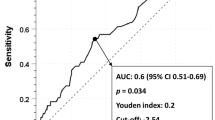Abstract
Background
The albumin–bilirubin (ALBI) score was originally developed to assess the severity of liver dysfunction in patients with hepatocellular carcinoma and has subsequently been used as a prognostic marker for that disease. Here, we examined the value of the preoperative ALBI score as a prognostic marker for patients with esophageal squamous cell carcinoma (ESCC) after radical esophagectomy.
Methods
We retrospectively analyzed data from 449 patients who underwent curative resection for ESCC. The ALBI score was calculated as (log10 serum bilirubin [μmol/l] × 0.66) + (serum albumin [g/l] × − 0.0852). Receiver operating characteristic curve analysis was used to define a preoperative modified ALBI (mALBI) score for patient stratification.
Results
Of the 449 ESCC patients, 232 and 217 were assigned to mALBI Grade 1 or Grade 2 groups based on preoperative ALBI scores of ≤ − 3.33 or > − 3.33, respectively. Preoperative mALBI grade was significantly associated with age, excessive alcohol consumption, squamous cell carcinoma antigen level, and clinical disease stage. The mALBI Grade 2 group had significantly shorter disease-specific and recurrence-free survival than the mALBI Grade 1 group. Multivariate analysis demonstrated that mALBI Grade 2 was an independent prognostic factor for disease-specific survival (hazard ratio 1.86, 95% confidence interval 1.18–2.93, P = 0.0074). In most subgroup analyses, mALBI Grade 2 was associated with a greater risk of disease-specific death.
Conclusions
mALBI grade serves as a simple and useful prognostic marker for disease-specific survival in patients with ESCC after radical esophagectomy.




Similar content being viewed by others
References
Siegel RL, Miller KD, Jemal A. Cancer statistics, 2019. CA Cancer J Clin. 2019;69(1):7–34.
Huang FL, Yu SJ. Esophageal cancer: risk factors, genetic association, and treatment. Asian J Surg. 2018;41(3):210–5.
Lagergren J, Smyth E, Cunningham D, et al. Oesophageal cancer. Lancet. 2017;390(10110):2383–96.
Johnson PJ, Berhane S, Kagebayashi C, et al. Assessment of liver function in patients with hepatocellular carcinoma: a new evidence-based approach—the ALBI grade. J Clin Oncol. 2015;33(6):550–8.
Chan AW, Chan RC, Wong GL, et al. New simple prognostic score for primary biliary cirrhosis: albumin-bilirubin score. J Gastroenterol Hepatol. 2015;30(9):1391–6.
Chen RC, Cai YJ, Wu JM, et al. Usefulness of albumin-bilirubin grade for evaluation of long-term prognosis for hepatitis B-related cirrhosis. J Viral Hepat. 2017;24(3):238–45.
Kanda M, Tanaka C, Kobayashi D, et al. Preoperative albumin-bilirubin grade predicts recurrences after radical gastrectomy in patients with pT2-4 gastric cancer. World J Surg. 2018;42(3):773–81.
Ando N, Kato H, Igaki H, et al. A randomized trial comparing postoperative adjuvant chemotherapy with cisplatin and 5-fluorouracil versus preoperative chemotherapy for localized advanced squamous cell carcinoma of the thoracic esophagus (JCOG9907). Ann Surg Oncol. 2012;19(1):68–74.
Kanda M, Koike M, Tanaka C, et al. Modified systemic inflammation score is useful for risk stratification after radical resection of squamous cell carcinoma of the esophagus. Ann Surg Oncol. 2019;26(13):4773–81.
Lerut T, Moons J, Coosemans W, et al. Postoperative complications after transthoracic esophagectomy for cancer of the esophagus and gastroesophageal junction are correlated with early cancer recurrence: role of systematic grading of complications using the modified Clavien classification. Ann Surg. 2009;250(5):798–807.
Zhang D, Zheng Y, Wang Z, et al. Comparison of the 7th and proposed 8th editions of the AJCC/UICC TNM staging system for esophageal squamous cell carcinoma underwent radical surgery. Eur J Surg Oncol. 2017;43(10):1949–55.
Inaoka K, Kanda M, Uda H, et al. Clinical utility of the platelet-lymphocyte ratio as a predictor of postoperative complications after radical gastrectomy for clinical T2–4 gastric cancer. World J Gastroenterol. 2017;23(14):2519–26.
Sasahara M, Kanda M, Ito S, et al. The preoperative prognostic nutritional index predicts short-term and long-term outcomes of patients with stage II/III gastric cancer: analysis of a multi-institution dataset. Dig Surg. 2020;37(2):135–44.
Kanda M, Koike M, Tanaka C, et al. Risk prediction of postoperative pneumonia after subtotal esophagectomy based on preoperative serum cholinesterase concentrations. Ann Surg Oncol. 2019;26(11):3718–26.
Kanda M, Shimizu D, Sawaki K, et al. Therapeutic monoclonal antibody targeting of neuronal pentraxin receptor to control metastasis in gastric cancer. Mol Cancer. 2020;19(1):131.
Thurnham DI. Interactions between nutrition and immune function: using inflammation biomarkers to interpret micronutrient status. Proc Nutr Soc. 2014;73(1):1–8.
Li J, Mei X, Sun D, et al. A Nutrition and Inflammation-Related Nomogram to Predict Overall Survival in Surgically Resected Esophageal Squamous Cell Carcinoma (ESCC) Patients. Nutr Cancer. 2021. https://doi.org/10.1080/01635581.2021.1957131.
Wang P, Li Y, Sun H, et al. Predictive value of body mass index for short-term outcomes of patients with esophageal cancer after esophagectomy: a meta-analysis. Ann Surg Oncol. 2019;26(7):2090–103.
Mengardo V, Pucetti F, Mc Cormack O, et al. The impact of obesity on esophagectomy: a meta-analysis. Dis Esophagus. 2017;31(6):1–9.
Okamura A, Watanabe M, Yamashita K, et al. Implication of visceral obesity in patients with esophageal squamous cell carcinoma. Langenbecks Arch Surg. 2018;403(2):245–53.
Liu B, Cheng B, Wang C, et al. The prognostic significance of metabolic syndrome and weight loss in esophageal squamous cell carcinoma. Sci Rep. 2018;8(1):10101.
Acknowledgements
We thank Anne M. O’Rourke, PhD, from Edanz (https://jp.edanz.com/ac) for editing a draft of this manuscript.
Author information
Authors and Affiliations
Corresponding author
Ethics declarations
Disclosure
All authors have no conflicts of interest to disclose.
Additional information
Publisher's Note
Springer Nature remains neutral with regard to jurisdictional claims in published maps and institutional affiliations.
Rights and permissions
About this article
Cite this article
Shinozuka, T., Kanda, M., Shimizu, D. et al. Prognostic Value of a Modified Albumin–Bilirubin Score Designed for Patients with Esophageal Squamous Cell Carcinoma After Radical Resection. Ann Surg Oncol 29, 4889–4896 (2022). https://doi.org/10.1245/s10434-022-11654-6
Received:
Accepted:
Published:
Issue Date:
DOI: https://doi.org/10.1245/s10434-022-11654-6




